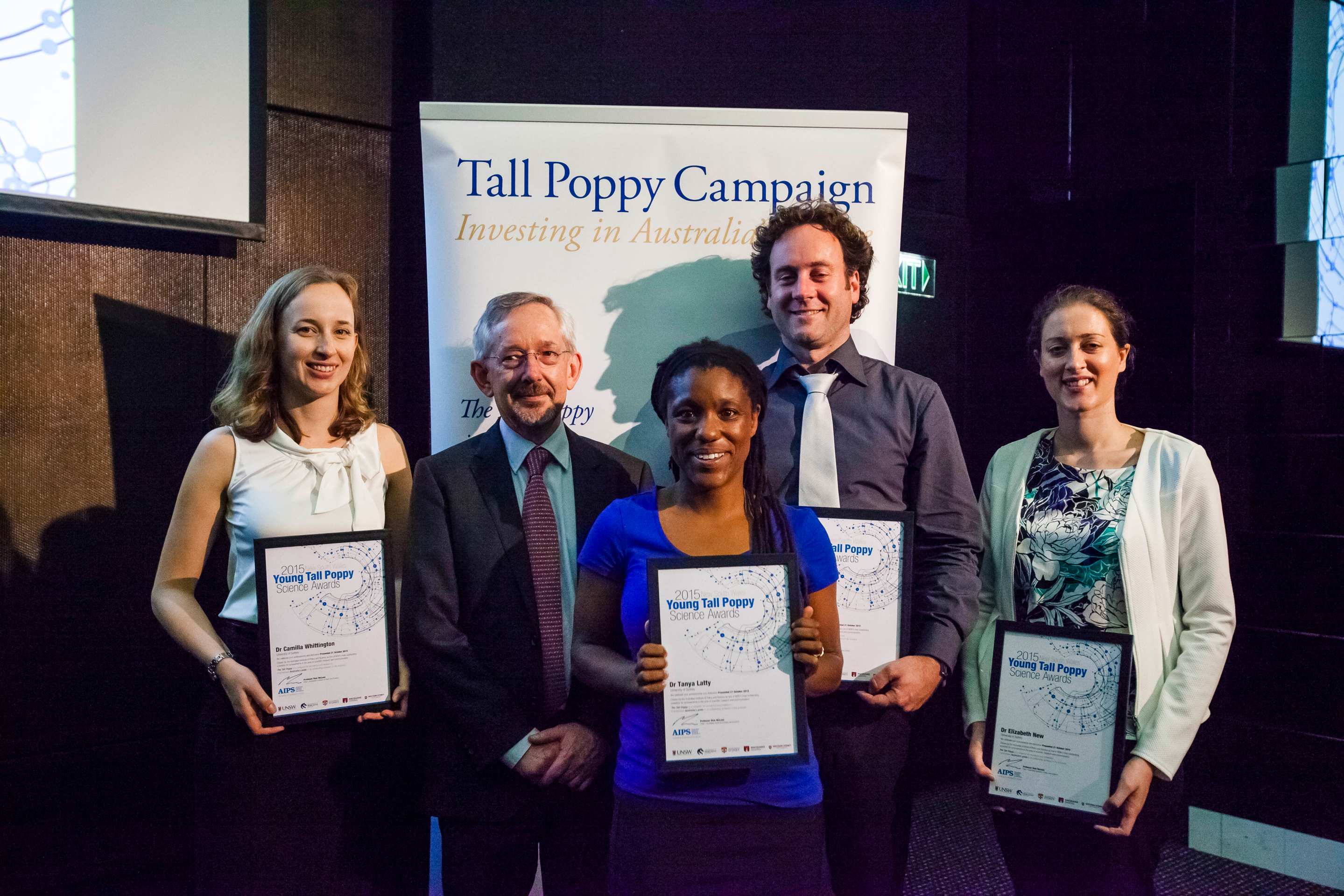Young scientists awarded, embark on year-long campaign
Five researchers from the University of Sydney have been recognised with prestigious Young Tall Poppy Science Awards. As part of the Young Tall Poppy Campaign, they will spend a year sharing their knowledge with school students, teachers and the broader community through workshops, seminars and public lectures.
Being a scientist is not about simply locking yourself away in a lab. I firmly believe all scientists have a duty to advocate ... and to communicate.

Dean of Science Professor Trevor Hambley (second from left) with Dr Camilla Whittington, Dr Tanya Latty, Dr Dan Johnstone and Dr Elizabeth New
Five bright young researchers from the University of Sydney were recognised with prestigious NSW Young Tall Poppy Science Awards at a ceremony at the Museum of Applied Arts and Science in Sydney last night.
These winners span the areas of psychology, evolutionary biology, animal behaviour, neuroscience and chemical bioinorganic chemistry. As part of the Young Tall Poppy Campaign, award winners will spend a year sharing their knowledge with school students, teachers and the broader community through workshops, seminars and public lectures. Those awarded are:
Dr Tanya Latty – from the Faculty of Agriculture and Environment
Dr Latty is working with computer scientists, mathematicians and engineers to apply what has been learned from ants toward building smarter and more efficient infrastructure systems. Ant colonies, honey bees and slime moulds exhibit 'swarm intelligence', where groups display intelligence far beyond the capacity of individuals. Ants, for example, run complex societies complete with transportation networks, communication systems and supply chains.
“Biological systems have had millions of years to evolve solutions to many of the same problems currently facing human engineers,” Dr Latty said.
Dr Latty appeared at Raising the Bar this week and a podcast of her talk is available here.
Dr Ben Colagiuri –from the School of Psychology in the Faculty of Science
Dr Colagiuri’s research explores the placebo effect. In the past five years, he has developed experimental models to uncover the mechanisms of the placebo effect in pain, nausea, and sleep. He hopes that better understanding will lead to improved methods for testing drugs in clinical trials as well as the development of novel interventions that capitalise on the placebo effect. These interventions improve positive patient outcomes (like pain relief) and minimise negative outcomes (like side effects).
Dr Colagiuri, also a 2014 recipient of the Australian Psychological Society Early Career Research Award, said: “The placebo effect is a fascinating phenomenon, with important implications for medical treatment and clinical trials.”
(Dr Colagiuri will be seen on SBS Insight on 10 November talking about his placebo research.)
Dr Camilla Whittington - from the School of Biological Sciences in the Faculty of Science
Dr Whittington is using cutting‐edge techniques to identify pregnancy genes, the instructions in an animal’s DNA causing it to have a live baby rather than laying an egg. Her work identifies the fundamental processes of pregnancy. This understanding is critical to designing captive breeding programs for threatened and endangered species.
“Pregnant lizards, seahorses and mammals face complex challenges, like having to provide nutrients to their embryos and protect them from disease,” Dr Whittington said. “My research suggests that these distantly related animals can use similar genetic instructions to manage pregnancy and produce healthy babies.”
Dr Dan Johnstone – from the School of Medical Sciences in the Faculty of Medicine
Dr Johnstone’s research is pioneering new ways to protect the brain against intractable age‐related neurodegenerative conditions such as Alzheimer’s and Parkinson’s diseases, using infrared light and saffron. These treatments are safe, non‐invasive, cheap, free from side effects and can be used in a patient’s home. But, most importantly, his research indicates they are effective. His goal is ultimately to develop and better understand these new treatments so that they can be made available to patients.
“Being a scientist is not about simply locking yourself away in a lab and running experiments,” Dr Johnstone said. “I firmly believe all scientists have a duty to advocate for scientific research and to communicate their research and its implications to the general public in a manner that is accurate but also accessible and engaging.”
Dr Elizabeth New – from the School of Chemistry in the Faculty of Science
Dr New’s research involves developing chemical tools to study biological systems. Her group is developing probes for fluorescence imaging, as well as for magnetic resonance imaging, focusing on the study of oxidative stress and metal ions in biology. These techniques will enable us to watch cells over time, and observe how they change as they develop diseases such as Alzheimer’s or diabetes, or when they are treated with potential therapeutic drugs.
Dr New, who was the 2014-15 Nyholm Youth Lecturer for the Royal Australian Chemical Institute, said: “It is exciting to be developing new tools that will help unravel biological processes, and to work with our medical research collaborators to see our tools put to good use.
“I’ve really enjoyed having the opportunity to share my love of science with high school students, and I look forward to continuing to do this through the Tall Poppy program.”